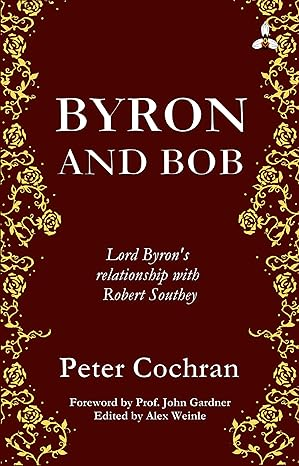Maximum Beef - The Greatest Foes in Poetry?
There's been Kendrick versus Drake. There's been Blur versus Oasis. There was Ali versus Foreman.
But do any of them compare with the sheer vitriol of Byron versus Southey?
Let's be clear, Byron was quite prepared to kill Southey (if at least within the honourable format of a duel), and Southey had no problem slandering Byron with the Georgian equivalent of a diddy party. It would be fair to say that Byron and Southey rank at least as highly as the feuds that ended the lives of The Notorious B.I.G., aka Biggie Smalls, and Tupac.
And there have been dis tracks - but has anyone spent the colossal effort to replicate, improve and ridicule their opponents' lengthy A Vision of Judgement (all 60-odd pages)?
In the history of authors who had 'beef' with each other, there are some great examples. Famously, Philip K Dick and Stanislav Lem both believed each other to be a construct of the opposing government - it's unclear if the reality of the other author's existence tempered their dislike. A.S. Byatt and Margaret Drabble hold a unique niche of sisters becoming literary nemeses. Hemingway was continuously getting into a kerfuffle.
Virginia Woolf and Arnold Bennett, at least, fell out over issues of proper quality. Each contended that there was a reason why previous generations had been unable to create characters that were real and convincing. Woolf calls out Bennett as only interested in external detail and proceeds to mansplain to him how inner machinations and wonder provide the crowning glory in 'ordinary' characters. There's a parallel here at least: Woolf outclasses Bennett as Byron outclasses Southey. Check out The Common Reader by Woolf on Gutenberg, regarding ordinary people and Chaucer.
And when Derek Walcott attacks V.S. Naipaul in his verse,
I have been bitten. I must avoid infection
Or else I’ll be as dead as Naipaul’s fiction.
It's short and sweet. He lacks the sheer venom of Byron's loathing of Southey to stretch this out to a hundred pages.
In painting, many artists fall out, but to quote one entertaining example, when Manet and Degas were best friends, they exchanged paintings with each other. Manet donated a still life of plums and Degas, a portrait of himself and his wife. Degas discovers that Manet, unhappy with the rendering of Suzanne (Degas' wife), had sliced the canvas in two and hung it wifeless. Outraged, Degas dispatched the still life with a note, "Monsieur, I am returning your Plums."
But why was this antipathy between Byron and Southey so ripe? Peter Cochran suggests that Southey is what Byron thinks he could have become: an existential nightmare of being mediocre. Is it possible that Southey, who became as overpious as Byron was a snob, also saw a wretched depth in Byron that he might stoop to, if conditions were different? When we find someone who moves us to intense, active aggression, is it because we see through a mirror darkly and recognize our potential shortcomings?
Southey began as a poet touted to write epics, a new Homer or Virgil, but now is only remembered by the populace for his Goldilocks fairy tale. If he'd been an ally to Byron, we might remember him more fondly.
Byron and Bob is out now on Bee Orchid Press.
Get a Copy
